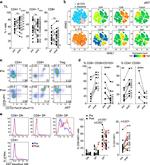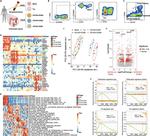Search Thermo Fisher Scientific
Invitrogen
CD103 (Integrin alpha E) Monoclonal Antibody (B-Ly7), PE, eBioscience™
FIGURE: 1 / 5
CD103 (Integrin alpha E) Antibody (12-1038-42) in Flow





Product Details
12-1038-42
Species Reactivity
Published species
Host/Isotype
Recommended Isotype Control
Class
Type
Clone
Conjugate
Excitation/Emission Max
Form
Concentration
Purification
Storage buffer
Contains
Storage conditions
Shipping conditions
RRID
Product Specific Information
Description: The B-Ly7 monoclonal antibody reacts with human CD103, the alpha E integrin. CD103 non-covalently associates with integrin beta 7. CD103 is expressed mainly on intraepithelial lymphocytes and a small subset of peripheral lymphocytes. CD103 is also expressed by hairy cell leukemia (HCL) and by some chronic B cell lymphocytic leukemias. In vitro stimulation of human T cells with mitogens induces upregulation of CD103. Epithelial cell antigen, E-cadherin, binds to CD103 and mediates homing of lymphocytes to the intestinal epithelium.
Applications Reported: B-Ly7 has been reported for use in flow cytometric analysis.
Applications Tested: This B-Ly7 antibody has been pre-titrated and tested by flow cytometric analysis of stimulated normal human peripheral blood cells. This can be used at 5 µL (0.25 µg) per test. A test is defined as the amount (µg) of antibody that will stain a cell sample in a final volume of 100 µL. Cell number should be determined empirically but can range from 10^5 to 10^8 cells/test.
Excitation: 488-561 nm; Emission: 578 nm; Laser: Blue Laser, Green Laser, Yellow-Green Laser.
Filtration: 0.2 µm post-manufacturing filtered.
Target Information
CD103 (ITGAE, Integrin alpha E) is molecule that is expressed on mucosa-associated T lymphocytes and activated cells and on subet of TGF beta -1 cells. In particular, CD103 includes a 150kDa alpha chain and a 120kDa beta chain. CD103 is expressed by 0.5 to 2% of resting lymphocytes in peripheral blood and lymphoid organs. CD103 antibody stains a few bone marrow cells and, rarely, peripheral blood lymphocytes. CD103 is part of the integrin family which are heterodimeric integral membrane proteins composed of an alpha chain and a beta chain. ITGAE encodes an I-domain-containing alpha integrin that undergoes post-translational cleavage in the extracellular domain, yielding disulfide-linked heavy and light chains. In combination with the beta 7 integrin, CD103 protein forms the E-cadherin binding integrin known as the human mucosal lymphocyte-1 antigen. CD103 is preferentially expressed in human intestinal intraepithelial lymphocytes (IEL), and in addition to a role in adhesion, it may serve as an accessory molecule for IEL activation. Diseases associated with CD103 dysfunction include hairy cell leukemia and splenic marginal zone lymphoma.
For Research Use Only. Not for use in diagnostic procedures. Not for resale without express authorization.

How to use the Panel Builder
Watch the video to learn how to use the Invitrogen Flow Cytometry Panel Builder to build your next flow cytometry panel in 5 easy steps.
Bioinformatics
Protein Aliases: antigen CD103; antigen CD103, human mucosal lymphocyte antigen 1; alpha polypeptide; CD103; DC; DCs; HML-1 antigen; human mucosal lymphocyte antigen 1, alpha polypeptide; integrin alpha E; Integrin alpha-E; Integrin alpha-IEL; integrin, alpha E (antigen CD103, human mucosal lymphocyte antigen 1; alpha polypeptide); Intregrin alpha E2; MGC141996; Mucosal lymphocyte 1 antigen
Gene Aliases: CD103; HUMINAE; ITGAE
UniProt ID: (Human) P38570
Entrez Gene ID: (Human) 3682

Performance Guarantee
If an Invitrogen™ antibody doesn't perform as described on our website or datasheet,we'll replace the product at no cost to you, or provide you with a credit for a future purchase.*
Learn more
We're here to help
Get expert recommendations for common problems or connect directly with an on staff expert for technical assistance related to applications, equipment and general product use.
Contact tech support

